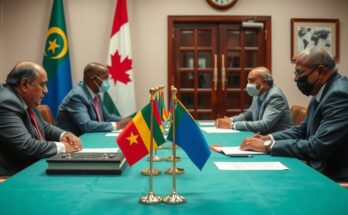In eastern DRC, the Catholic Church faces the challenge of delivering humanitarian aid and hope amidst ongoing violence between rival rebel groups. With access to basic necessities hampered and a weakened healthcare system impacting the population, the Church remains committed to its mission, advocating for support and resilience. Leaders speak on the importance of hope, health care, and skills training in restoring livelihoods for affected communities.
In the eastern Democratic Republic of Congo (DRC), a region grappling with one of the world’s most severe humanitarian crises, the Catholic Church is facing the dual challenge of providing essential resources and instilling hope among devastated populations. Bishop Sikuli Paluku Melchisédech of Butembo-Beni asserts that despite the precarious circumstances, the Church remains committed to its mission to support those in need, even as conflicts ravage the area. The local crisis is exacerbated by fighting between rival rebel groups, specifically the Allied Democratic Forces (ADF) and the March 23 Movement (M23), both of which are vying for control over the region’s abundant mineral resources. This ongoing violence has displaced thousands, forcing families from their homes and disrupting access to vital services such as healthcare and education. The humanitarian coordinator for the diocese, Francois Kaputu, describes the severe toll this conflict has taken: “For over two decades, the diocese of Butembo-Beni has been faced with an unbearable social, security and humanitarian situation.” The environment is particularly dire, with rural areas under siege from both ADF and M23 forces, leading to widespread poverty and displacement. The resulting sociopolitical instability has severely strained agricultural production, on which the local economy heavily relies, further jeopardizing food security. Access to farming has become increasingly difficult, leaving many without the basic means to sustain their families. Kaputu specifically notes, “the population is living under siege,” an indication of the grim living conditions many endure as they seek safety. Moreover, the health care infrastructure in the region is in tatters, with valuable resources such as solar panels and refrigeration units looted, resulting in a critical shortage of medicines at a time when diseases like M’Pox are emerging as threats. Just recently, a case of this disease was reported in Alindo, highlighting the dire need for effective health services. “The priority needs include essential survival items or household and social products. Additionally, health remains a significant concern,” he emphasized. In light of this, a temporary cessation of hostilities has been observed to facilitate the delivery of humanitarian aid, allowing organizations like Caritas to respond effectively. Kaputu sheds light on the efforts that have been put forth, stating, “It is a situation that requires much more resources than are available,” and underscored the need for collaboration and support from those willing to assist. The Church’s commitment to hope persists amidst adversity, focusing on youth empowerment through skills training and outreach. Bishop Sikuli reinforces this sentiment, emphasizing the moral imperative to act in service of humanity. He expresses gratitude and encouragement to health workers in the region, reassuring them of the impactful nature of their contributions, stating, “Despite the insecurity and difficult situations in our diocese, you continue to do your jobs to relieve the sick. The diocese has become large, the needs are many, but no one can claim to do all the good, but the little good that we can do, we must do well.” In summary, the Catholic Church in eastern Congo is not only addressing immediate humanitarian needs but is also working diligently to restore a sense of hope within the communities it serves, focusing on holistic support that prioritizes health, education, and personal development. This mission requires collective action and resources, showcasing the Church’s resilience amid relentless challenges.
The eastern Democratic Republic of Congo is currently embroiled in a complex humanitarian crisis driven by violent conflicts between various armed groups. In particular, the ADF and M23 rebel factions are in fierce competition for territorial control and mineral resources, displacing thousands and wrecking the socio-economic fabric of the region. The Catholic Church plays a pivotal role in responding to these challenges, providing not only physical necessities but also fostering hope and community resilience among affected populations.
The Catholic Church’s endeavors in eastern Congo highlight a significant commitment to humanitarian care in an environment overshadowed by violence and conflict. Despite resource constraints, the Church strives to provide essential aid, restore hope, and empower individuals through skills development, embodying a holistic approach to community support even amid dire circumstances.
Original Source: cruxnow.com




